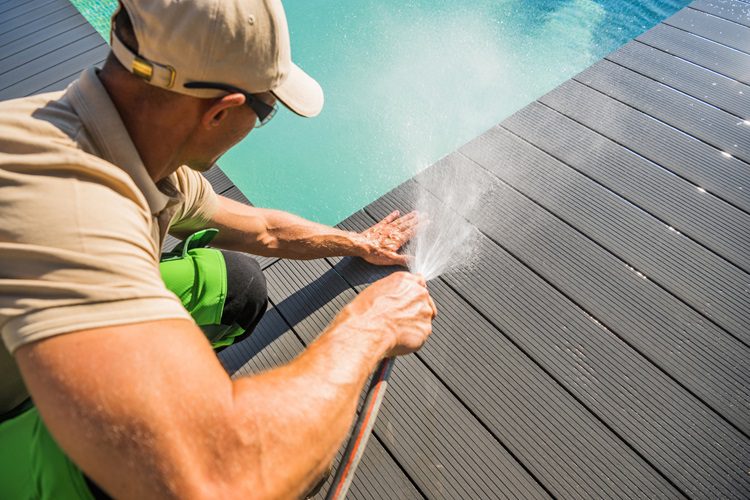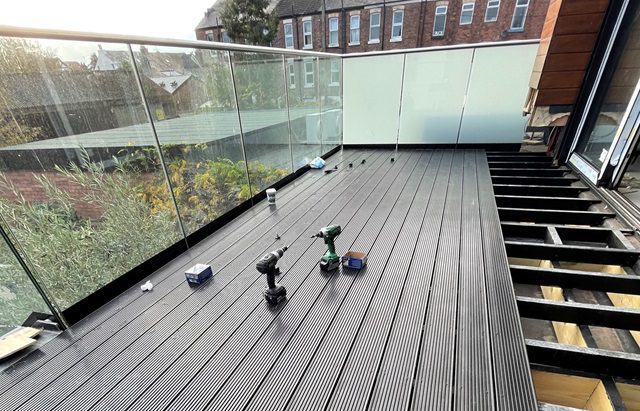Composite decking is extremely robust, durable, and long-lasting. However, there are a few issues we occasionally get asked about, so we’ve asked our experts to give us their trouble-shooting solutions to help you keep your composite decking looking like new for longer.
How do I remove dirt and mould from my composite deck?
Ecodek’s composite decking boards are extremely low maintenance, but do require the occasional clean to keep them looking their best.
Following the below steps will help to keep your decking looking like new all year round:
- Remove all furniture and other items from the decked area
- Sweep the decking, removing all leaves and other debris
- Clean all debris from gaps between boards to allow for proper drainage
- Make up the cleaning solution as directed on the bottle and apply to the surface of the deck using a soft mop (or very soft nylon bristle brush) and gently work into the surface. Allow the solution to sit for 15 – 20 minutes. If you are unsure as to which cleaner to use, do contact us for advice
- Go over the surface again with any remaining solution and immediately rinse off the solution using a garden hosepipe ensuring all the solution is removed
- Do not be tempted to use jet wash. Using our recommended WPC cleaner and a common garden hose is more than enough to clean and restore your composite decking and you may risk damaging the deck surface due to the high pressure some jet wash machines can produce
- Let the decking dry fully before putting any furniture and other accessories back. If you discover any difficult to remove stains, please contact our Technical Department for advice on how best to remove it. Please do not use a jet wash or harsh chemicals as they may cause damage to the surface.

Why are my composite deck boards warping?
The most common cause of warped composite decking boards is poor installation. All composite boards require expansion gaps to be left, as well as effective ventilation and airflow systems. The reason for your boards warping or sagging will be down to the following causes:
- Incorrect fixing centres: Centre’s should be between 600mm and 450mm or less depending on the style of decking board
- Incorrect expansion gaps: there should be a 5mm gap between board ends and a 5-10mm gap between the decking and surrounding hard surfaces, such as walls and fences
- Incorrect screw placement: Screws should be between 20mm and 40mm from the end of the boards
- No double bearer system used: Two ends of two composite boards should not share one bearer. This will impact the points above and lead to warping of the boards
- Incorrect number of screws used: Two screws must be used at every joist point
- Lack of ventilation and drainage gaps: There must be a minimum of 5mm or 10mm gap for ventilation. If your deck is poorly ventilated it can lead to warping
- Lack of void underdeck: There must be a minimum 80mm cavity from the bottom of the deck board to the original floor level.
By identifying the fault, you should be able to prevent your boards warping the future. Talk to our experts today for more information.
Why have my deck boards faded?
We manufacture our boards from recycled products and hardwood fibres, which although are better than softwood, the colour pigment will fade within the wood fibres. There will be some fade visible over the first few months, giving a more textured appearance and this is a standard process called weathering. This is apparent in nearly all building materials used outdoors. Depending on what supply we have of that time the boards can be made from darker plastics and woods giving it a different shade between batches runs. If you’re concerned about your deck boards fading, speak to a friendly member of our team who will be able to help.
Why are the screws in my composite decking shearing?
The main reasons for screws shearing are:
- Lack of predrilling boards and bearers
- Incorrect screws used – our colour-coded balcony screws should be used on metalwork 1.5-5mm thick. For thicker gauge screw, our HD non-colour coded screws should be used.
Why is water pooling on my composite decking?
Water pooling on your composite decking is most likely caused by poor installation or from not following the installation instructions correctly. The most common causes for water pooling are:
- Lack of ventilation and drainage gaps: There must be a minimum of 5mm or 10mm gap for ventilation.
- Incorrect fixing centres: Centre’s should be between 600mm and 450mm or less depending on the style of decking board
- One of the joists on the framework has sagged slightly, causing water to pool along that fixing point.
If you are concerned about water pooling on your composite decking, talk to our knowledgeable service team today about how you can resolve the problem.
If you have any concerns about your composite decking, call or email us today and we will help you get your decking back to its best.
